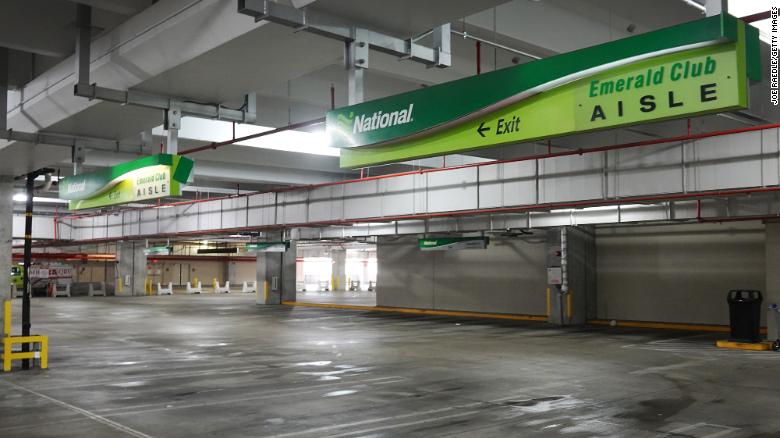Why did the price of cars rise in the US?
2:16
(CNN Business) -
Car dealership lots have only a fraction of the vehicles, both new and used, that they normally own.
That is helping drive prices to record levels and increase the country's overall inflation rate.
And the price increases are not over yet.
The average price of a new car hit a record $ 38,255 in May, according to JD Power, up 12% from the same period a year ago.
Why are electric cars so heavy?
1:13
About two-thirds of car buyers paid within 5% of the tag price in May, and some even paid above the tag.
Wholesale prices for used cars sold at auction have risen 39% since the beginning of this year, according to other data from JD Power.
Used car retail prices were up 20%, that's more modest in the same period.
But it's also a significant jump for this time of year, and higher wholesale prices point to bigger increases along the way.
advertising
"That puts used car wholesale prices at the highest level they've ever been," said David Paris of JD Power.
"And we are seeing used retail prices accelerating rapidly."
The US economic rebound has pushed consumer prices up at the fastest pace in nearly 13 years, with used car prices responsible for a third of the overall 5% increase in May.
The recovery in the world economy picks up momentum, but there are still considerable risks
It's a 180-degree change in the market from a year ago, when many car dealerships were closed due to the pandemic or limited to providing service and maintenance.
Massive job losses and the switch to working from home caused a 30% drop in car sales in the second quarter of 2020, the biggest quarterly drop since the Great Recession.
Now sales are booming, with the May seasonally adjusted sales rate for new car sales to consumers increasing 34% compared to the previous year, and 10.6% compared to the month of sales plus normal May 2019.
Supply chain problems
But the resurgent demand comes at a time when auto plants around the world are closed or running at reduced production due to a shortage of computer chips.
New car production in North America fell by about 3.4 million vehicles in the first three months of this year, according to Cox Automotive.
And most automakers reported second-quarter production declining even more than in the first quarter.
The used car market is just as tight, with some supply and demand measures in the sector showing the largest shortage on record.
Those two factors, strong sales and limited supply, are fueling the price boom.
"It's a perfect storm," said Charlie Chesbrough, a senior economist at Cox Automotive.
“If you are not willing to pay almost the price tag, there is someone behind you who is.
These problems will probably be with us for at least the rest of this year.
Elon Musk blames rising Tesla prices on raw material costs
Here's a look at the main factors leading to the price increase:
Limited resources
The shortage of computer chips is just one factor that reduces the inventory of available vehicles.
Other auto parts, including tires and resins, are beginning to be in short supply, experts say.
The limit on the availability of new cars is being felt in the used car market.
Car rental companies, which sold about a third of their fleets last year to raise cash and survive the recession, now have their own car shortage just as travel is picking up.
An empty car dealership is in Laurel, Maryland.
The chip shortage also means automakers don't have an oversupply of new cars that they can sell to rental companies at a discount.
"[Car rental companies] typically buy 2 million vehicles a year, and that's the number of cars they typically sell on the market," said Ivan Drury, Senior Director of Information at Edmunds.com.
"Since automakers can't sell to them right now, that one and two year vehicle turnover just isn't happening right now."
Here's how the chip shortage affects GM customers 1:11
People returning to work
As offices reopen, workers who had stayed at home are beginning to resume commuting, further driving demand for cars.
Employers added 559,000 jobs in May, but that's only part of the story.
Other employers are notifying workers that offices that have been closed since last year will reopen in the coming months.
Would you go back to the office when the pandemic ended?
0:42
Many of those who delayed buying new cars due to job uncertainty or lack of a commute are now looking to buy.
And some of those who took public transportation to and from work may now want their own car to limit their potential exposure to COVID-19.
"People who are concerned about public transportation and Uber are a factor in the growing interest," said Nick Woolard, director of Industry Analysis for TrueCar.
More cash available, low interest rates
Many workers lost their jobs and faced economic setbacks in the past year.
But those who kept their jobs may have more cash on hand than normal.
By some estimates, Americans have an additional $ 2.4 trillion in savings, compared to a year ago.
Spending on activities like vacations and dining out fell, as did the cost of commuting.
Record stock market values often fuel strong car sales as well, as the wealth effect leads consumers to save less money for long-term savings.
And then there were the various stimulus payments from the government, which totaled thousands of dollars for many households.
Buying a house in the US is a bidding competition 3:08
Low interest rates allow many buyers to spend less on car payments than they would have otherwise.
And the home refinancing boom in the last year cut mortgage payments by the millions, sometimes enough to budget for a car payment where it hadn't before.
A move away from cheaper cars
Part of what drives new car prices up is what consumers want to buy now.
The shift from less expensive sedans to more expensive SUVs and trucks accelerated even before the pandemic.
Automakers are responding by cutting production on their less popular models to preserve the computer chips they have available for SUVs and trucks, although even those models are experiencing reduced production.
A vacant lot at the National rental agency at Miami International Airport.
Many new car buyers are also drawn to the next generation of options.
"People can't buy enough content when they pull the trigger on new vehicles," Drury said.
“They are buying high levels of equipment and many options.
For certain trucks, they are paying double the label price of the base model, just for the options.
This little electric car looks like a washing machine and costs only $ 6,600
Dealers, not automakers, are the big winners
Automakers are benefiting because they don't have to offer many incentives.
Still, the supply shortage is hurting its results.
Ford and General Motors expect the chip shortage to cost them more than $ 1 billion in profits this year.
The big winners: the car dealers.
That includes the thousands of private dealerships, as well as publicly traded AutoNation, which specializes in new cars, and CarMax, which focuses on used cars.
AutoNation posted record first-quarter earnings in April, tripling its earnings from the prior year.
"This is a near perfect operating environment for being a car dealership," said Ali Faghri, an analyst at Guggenheim Securities, which follows auto retailers.
“The demand is incredibly robust, you have several tailwinds that have all converged at the same time.
You are not only selling a lot of cars at the moment, but with record margins.
Even with automakers hit by chip shortages, the industry has come roaring back to a level that was inconceivable a year ago.
UK to ban sale of some 1:15 cars
"If I had told you 12 months ago that we would be in this situation, with record vehicle sales and prices, you would never have believed me," Faghri said.
"It unfolded very differently than most people expected when the pandemic first hit."
One potential downside for the industry is that prices could eventually become prohibitively high, discouraging buyers.
The University of Michigan Consumer Survey found that more consumers are concerned about rising prices for homes, vehicles, and durable household goods than at any time in decades.
"These unfavorable market price perceptions reduced overall car and home buying attitudes to their lowest point since 1982," said Richard Curtin, chief economist of the survey.
Price Increase Cars Inflation








